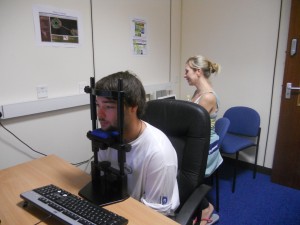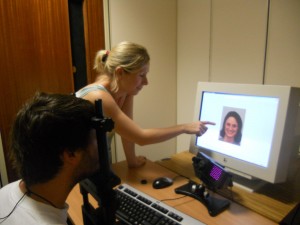 Prosopagnosia – or ‘face blindness’ – is a little known condition affecting 1 in 50 people. As Bournemouth University psychology lecturer Dr Sarah Bate explains, it is ‘literally a loss of memory for faces’.
Prosopagnosia – or ‘face blindness’ – is a little known condition affecting 1 in 50 people. As Bournemouth University psychology lecturer Dr Sarah Bate explains, it is ‘literally a loss of memory for faces’.
Speaking to BBC Inside Out’s Jon Cuthill, Dr Bate said: “Prosopagnosia sufferers know what a face is. They know the basic configuration of a face, but they absolutely fail to indentify individuals, no matter how close those people are to them.”
Dr Bate and her team at Bournemouth University have developed a brand new test to identify how good people are at face recognition. It works by processing patterns in eye movement whilst looking at a face.
The findings show that in control trials, participants scan the face in a triangular pattern, looking at the eyes, nose and mouth. In contrast, prosopagnosia sufferers compensate for their lack of recognition by looking at external features of the face, such as the ears and hair.
You can find out more about BournemouthUniversity’s research into the condition by watching Dr Bate’s recent interview on BBC Inside Out. The feature is 11 minutes in.
http://www.bbc.co.uk/iplayer/episode/b0160zzv/Inside_Out_South_17_10_2011/
You can test yourself for prosopagnosia at Sarah’s website: www.prosopagnosiaresearch.org.
 A couple of months ago we ran a blog post about the amazing research into prosopagnosia (face blindness) being undertaken at Bournemouth University by
A couple of months ago we ran a blog post about the amazing research into prosopagnosia (face blindness) being undertaken at Bournemouth University by 










 REF Code of Practice consultation is open!
REF Code of Practice consultation is open! BU Leads AI-Driven Work Package in EU Horizon SUSHEAS Project
BU Leads AI-Driven Work Package in EU Horizon SUSHEAS Project Evidence Synthesis Centre open at Kathmandu University
Evidence Synthesis Centre open at Kathmandu University Expand Your Impact: Collaboration and Networking Workshops for Researchers
Expand Your Impact: Collaboration and Networking Workshops for Researchers ECR Funding Open Call: Research Culture & Community Grant – Apply now
ECR Funding Open Call: Research Culture & Community Grant – Apply now ECR Funding Open Call: Research Culture & Community Grant – Application Deadline Friday 12 December
ECR Funding Open Call: Research Culture & Community Grant – Application Deadline Friday 12 December MSCA Postdoctoral Fellowships 2025 Call
MSCA Postdoctoral Fellowships 2025 Call ERC Advanced Grant 2025 Webinar
ERC Advanced Grant 2025 Webinar Update on UKRO services
Update on UKRO services European research project exploring use of ‘virtual twins’ to better manage metabolic associated fatty liver disease
European research project exploring use of ‘virtual twins’ to better manage metabolic associated fatty liver disease